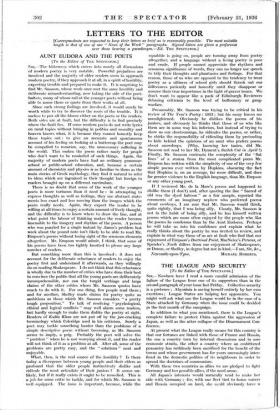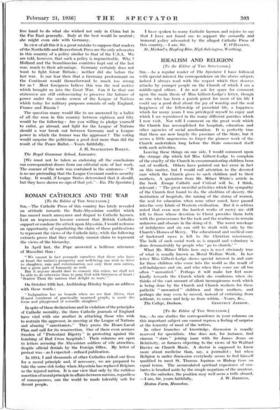THE LEAGUE AND SECURITY
[To the Editor of THE SPECTATOR.] Sia,—Nowlicre have I read a more candid admission of the failure of the League from one of its supporters than in the second paragraph of your issue last Friday. Collective security is a pretence ; Abyssinia is saving herself entirely by her own exertions ; League States are helping her opponents. You might well ask what use the League would be in the case of State attacked by Germany when the issue could be decided in the first month of the campaign.
In addition to what you mentioned, there is the League's complete failure to protect China against the aggression of Japan, as well as the utter collapse of the Disarmament Con- ference.
At present what the League really means for this country is that our fortunes are linked with those of France and Russia, the one a country torn by • internal dissensions and in sore economic straits, the other a country where an embittered peasantry has ruthlessly been sacrificed for the benefit of the towns and whose government has for years unceasingly inter- fered in the domestic politics of its neighbours in order to spread the doctrines of communism.
. With these two countries as allies we are pledged to fight Germany and her possible allies, if the need arose.
All Japan's interests would naturally tend• to make her side with Germany; for, with our fleet -tied to home waters and Russia occupied on land, she could obviously have a free hand to do what she swished not only in China but in the Far East generally. Italy at the best would be neutral ; she might even side with Germany.
In view of all this it is a great mistake to suppose that readers of the Northcliffe and Beaverbrook Press are the only advocates in this country of a policy similar to that of the U.S.A. We are told, howeVer, that such a policy is impracticable. Why ? Holland and the Scandinavian countries kept. out of the last war, much to their advantage. Germany certainly does not Want to fight Great Britain ; neither did she before the last war. Is our fear then that a Germany predominant on the Continent would thenceforward be much too strong for us ? Mist foreigners believe this was the real motive which brought us into the Great War. Can it be that our statesmen are still endeavouring to preserve the balance of power under the smoke screen of the League of Nations which today for military purposes consists of only England, France and Russia ?
The question many would like to see answered by a ballot of all the men in this country between eighteen and fifty would be the following : Are you willing to pledge yourself to enlist, go abroad, and fight for the League of Nations should a war break out between Germany and a League power in which the former was the aggressor ? The voting would surprise the politicians a good deal more than did the result of the Peace Ballot.—Yours faithfully, [We must not be taken as endorsing all the conclusions our correspondent draws from our editorial note of last week. The essence of the note was contained in the sentences—" It is no use pretending that the League Covenant confers security today. It would, if League States determined that it should, but they have shown no sign of that yet."—ED. The Spectator.]















































 Previous page
Previous page